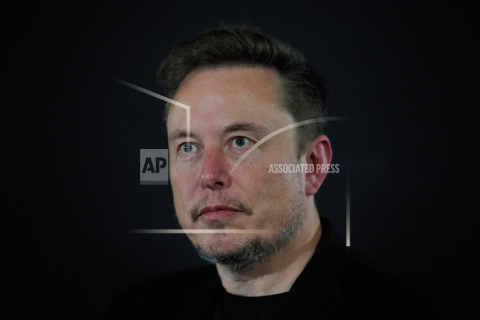JERUSALEM (AP) — Elon Musk, who’s been under fire for endorsing an antisemitic conspiracy theory and wider accusations of hatred flourishing on his social media platform X, visited Israel, where he toured a kibbutz attacked by Hamas militants and held talks with top leaders.
The billionaire met with Israeli President Isaac Herzog, who scolded him over content on the platform previously known as Twitter, and joined Israeli Prime Minister Benjamin Netanyahu for a tour of the Kfar Azza kibbutz, a rural village that Hamas militants stormed on Oct. 7 in a deadly assault that launched the war.
Wearing a protective vest and escorted by a phalanx of security personnel as rain fell, Musk used his phone to take photos or videos of the devastation, according to video released by Netanyahu’s office. Musk’s visit came as Israel and Hamas reached a deal to extend a cease-fire for two more days.
The Tesla CEO and prime minister visited the damaged homes of victims, including the family of Abigail Edan, a 4-year-old girl with dual Israeli-U.S. citizenship who was held hostage by Hamas after her parents were killed. She was released Sunday in the latest round of exchanges during a cease-fire in Gaza set to expire after Monday.
“It was jarring to see the scene of the massacre,” Musk said in a conversation with Netanyahu streamed on X. He said he was troubled by video and photos that the prime minister showed him of the killings of civilians, including children.
They spoke broadly about the conflict, the protests it has generated, the Middle East and more but did not touch on antisemitism online. Netanyahu, who urged a rollback of such hatred in a September meeting with Musk, said he hoped the billionaire would be involved in building a better future. Musk replied, “I’d love to help.”
Herzog did confront Musk, saying that “the platforms you lead, unfortunately, have a huge reservoir of hatred, hatred of Jews and antisemitism.”
The Israeli president was joined in the meeting by some of the families of hostages held by Hamas in Gaza, according to a statement from Herzog’s office.
“Hatred of the Jews affects the behavior of people in many places around the world, and you have a huge role to play in this,” Herzog told Musk.
The X owner responded that it had been a “difficult day emotionally” following the tour and that “we have to do whatever is necessary to stop the hate,” according to Herzog’s office.
Referring to Hamas militants, Musk said, “It’s amazing what humans can do if they’re fed lies since they were children. They will think that murdering innocents is a good thing, which shows how much propaganda can affect people’s minds.”
Musk has faced accusations from the Anti-Defamation League, a prominent Jewish civil rights organization, and others of tolerating antisemitic messages on the platform since purchasing it last year. The content on X has gained increased scrutiny since the war between Israel and Hamas began in October.
A slew of big brands, including Disney and IBM, decided this month to stop advertising on the platform after a report by liberal advocacy group Media Matters said ads were appearing alongside pro-Nazi content and white nationalist posts.
The same week, Musk responded on X to a user who accused Jews of hating white people and professing indifference to antisemitism by posting, “You have said the actual truth.” He has faced outcry, including from the White House.
The billionaire, who has described himself as a free-speech absolutist, tweeted during his Israel visit that “actions speak louder than words.”
X has since sued Media Matters, saying the Washington-based nonprofit manufactured the report to “drive advertisers from the platform and destroy X Corp.”
Israeli government spokesperson Eylon Levy declined to say whether Musk was invited to the country or came on his own. X, formerly known as Twitter, did not respond to a request for comment.
Israel also settled a spat with Musk over his Starlink satellite internet company, with Starlink agreeing to operate in Gaza only with government approval.
“As a result of this significant agreement, Starlink satellite units can only be operated in Israel with the approval of the Israeli Ministry of Communications, including the Gaza Strip,” Communications Minister Shlomo Karhi tweeted.
The two had tangled online previously after Musk promised that Starlink would support connectivity to internationally recognized aid groups in Gaza, drawing a rebuke from Karhi, who said Israeli would fight it because Hamas would use the service for militant activities.




